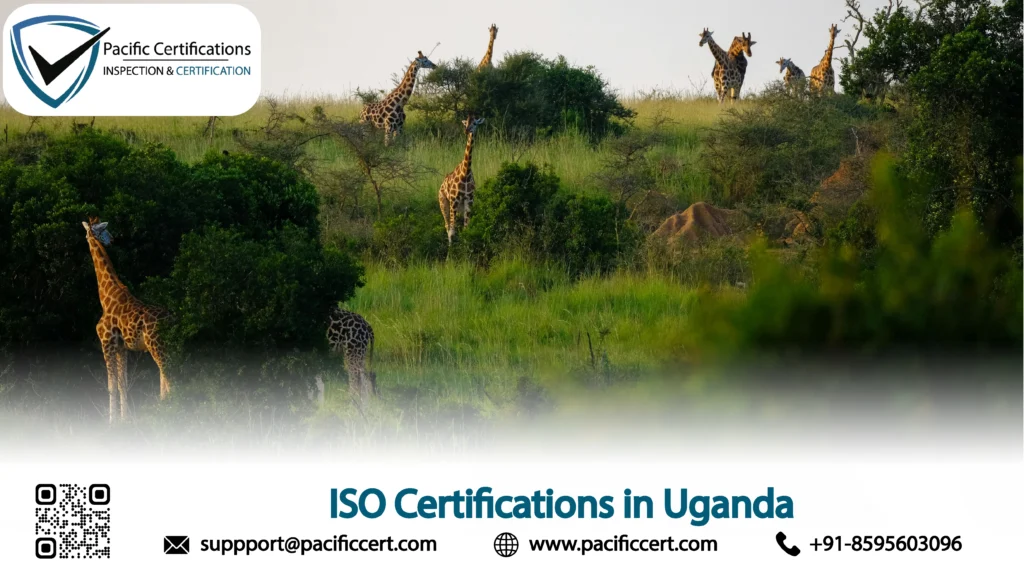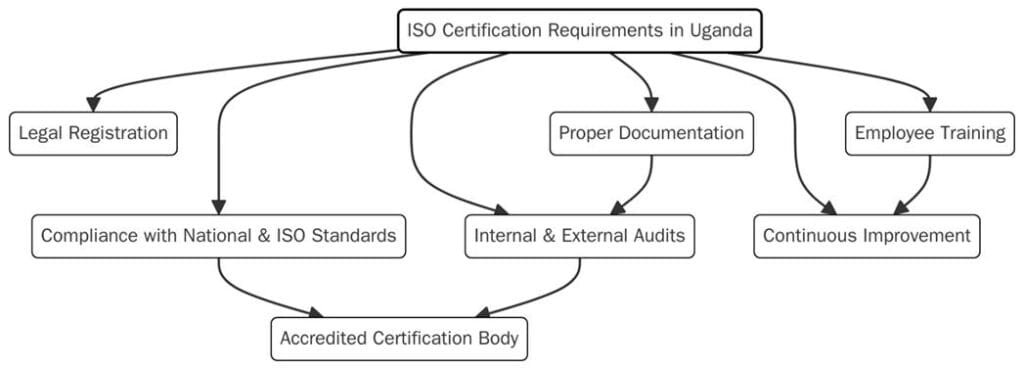
Introduction
Uganda’s economy is anchored by agriculture and agrifood, construction and infrastructure, manufacturing, logistics and trade, tourism, healthcare and education, plus an emerging oil and gas value-chain around the Albertine region and the East African Crude Oil Pipeline (EACOP). Recent World Bank and IMF updates point to GDP growth above six percent, low inflation and a positive medium-term outlook, with growth expected to climb further once oil production starts later in the decade.
By adopting ISO 9001 (Quality Management), ISO 14001 (Environmental Management) and ISO 45001 (Occupational Health & Safety), Ugandan organisations can stabilise service and works quality, reduce waste and incidents and move faster through vendor checks with regional buyers, lenders and donors.
Share your scope and sites for Uganda with Pacific Certifications and we will map accreditation coverage, recommended audit days and Stage 1 and Stage 2 windows that fit your projects and operating seasons.
Economic context and industry overview
Uganda’s recent economic updates show growth in the range of 6.1 to 6.8 percent, driven by agriculture, manufacturing, construction and domestic demand, with inflation staying below the five percent target. Agriculture still supports a large share of employment and export earnings, while industry and services are expanding around urban centres such as Kampala, Jinja, Mbarara and Gulu.
At the same time, Uganda faces fiscal pressures and the need to improve revenue collection and public spending, which keeps attention on governance, transparency and value for money in public and donor-funded projects.
Why ISO certifications matter in Uganda?
Buyers, financiers and public bodies want evidence-based systems with traceable records. ISO management systems help teams pass vendor reviews faster, keep worksites and service lines steady, cut incident rates, and protect data and uptime.
With ISO 9001, contractors, utilities, industrial parks, workshops, hospitals, universities, and service companies gain firm process control and supplier oversight.
For EHS performance, ISO 14001 and ISO 45001 lift discipline on construction sites, plants, depots, terminals, and oil or energy projects where safety, emissions, and community impacts face closer scrutiny. On energy, ISO 50001 helps large users show measured performance where tariffs and fuel costs matter.
Popular ISO standards in Uganda
| Industry focus | Commonly requested standards | Why they matter |
| Construction, EPC, roads and public works | ISO 9001, ISO 14001, ISO 45001, ISO 22301 | Works quality, site safety, environmental control, continuity on key assets |
| Oil and gas, EPC and pipeline contractors | ISO 9001, ISO 14001, ISO 45001, ISO 50001, ISO 22301 | Project control, EHS, energy performance, continuity and stakeholder assurance |
| Agrifood, mills, export crops and cold-chain | ISO 22000, ISO 9001, ISO 14001 | HACCP, traceability, hygiene, waste and emissions control |
| Logistics, warehousing and corridor transport | ISO 9001, ISO 14001, ISO 45001, ISO 28000 | Service stability, yard safety, chain-security |
| Banks, microfinance, fintech, telecom and cloud | ISO/IEC 27001, ISO 22301, ISO/IEC 20000-1, ISO/IEC 27701 | Security, uptime, IT-service quality, privacy |
Certification process in Uganda
Preparation starts with an honest view of how work runs today and how evidence is captured. The aim is to make your system auditable without reinventing daily routines. Below are the steps to consider:
- List products, services, sites, headcount and high-risk processes for a clear scope.
- Map processes end to end so handoffs, records and responsibilities are visible from field or factory to customer, patient or beneficiary.
- Set policy and measurable objectives linked to customer, legal, lender or donor needs, including safety, environment and social targets where relevant.
- Assemble evidence packs for operations, maintenance, labs, IT, HSE, logistics, finance and support functions.
- Blend on-site checks with remote interviews and document-reviews where suitable, to manage travel time and regional access.
- Keep permits, licences, inspection reports, regulator letters and donor or lender correspondence organised for quick verification.
What are the requirements of ISO certifications in Uganda?
Implementation should mirror real work in project sites and quarries, industrial parks and workshops, clinics and labs, farms and mills, hotels and cold rooms, warehouses and data rooms so records hold up in audits, inspections and buyer or donor visits. Below are the key requirements:

- Scope aligned to products or services, processes and sites, including projects, mobile teams and multi-site programmes.
- Controlled documents and records that reflect practice, with version-control and clear access rules for site and head-office staff.
- Risk assessment with operational controls for actual hazards such as lifting and work at height, traffic and transport, HACCP, environmental aspects, privacy or security, energy and change-management.
- Competence matrices and training records for process owners and high-risk roles in operations, maintenance, logistics, HSE, IT, quality and community-relations.
- Internal audits with reports, non-conformities, root-cause analysis and verified closures across sites, contractors and key suppliers.
Tip: Align your controls with Ugandan laws and sector rules, with NEMA and sector regulators, with EACOP and oil-project requirements where applicable and with donor or lender safeguards for infrastructure and social programmes.
What are the benefits of ISO certifications in Uganda?
Use certification to move faster through tenders, PPP or donor checks, vendor onboarding and programme selection and to keep work steady through demand swings, seasonal constraints and site risks. Below are the key benefits:
- Faster pre-qualification in buyer, lender and donor portals for construction, energy, logistics, services and social programmes.
- Lower incident, defect and stoppage rates on sites, lines, yards and service routes, which cuts re-work, downtime and claims.
- Clear roles and skill paths for operators, technicians, drivers, HSE, supervisors and back-office staff, which supports cover and handover.
- Traceable data for investigations, warranty claims, ESG notes and due-diligence by investors, lenders or partners.
- Stronger supplier and contractor control through audits, KPIs and corrective actions across transport, subcontractors, waste, utilities and IT providers.
Market Trends
World Bank and IMF reports highlight strong growth and low inflation in recent years, with oil production expected to raise growth toward double digits around FY 2026 or FY 2027 once EACOP and field facilities are complete. This outlook, plus resumed funding by development partners, is pushing more organisations to formalise their management systems so they can meet lenders and investors expectations.
Demand is rising for integrated ISO 9001, ISO 14001 and ISO 45001 systems in construction, EPC, public works, logistics and oil or energy projects. Agrifood exporters, mills and cold-chain providers show growing interest in ISO 22000 for traceability and HACCP, while banks, mobile-money, telecom and cloud services increasingly look to ISO/IEC 27001, ISO 22301 and ISO/IEC 20000-1 to structure security and continuity around digital services.
Challenges faced in Uganda
Expectations on quality, safety, environment, social impact and data-handling are rising while many organisations still handle capacity, cash-flow and infrastructure constraints. In practice, the main hurdles are:
- Budgeting time and funds for certification and system upkeep when margins are thin, or projects are short-term.
- Treating ISO as paperwork in some teams, which slows use of procedures and records in daily decisions.
- Shortage of trained internal auditors and technical specialists outside Kampala and main hubs.
- Gaps in document-control, internal audits, corrective-action follow-up and record-keeping across multi-site and contractor-heavy scopes.
- Travel, access, weather and project scheduling that complicate multi-site sampling, meetings and evidence collection for audits.
What is the cost of certification in Uganda?
Budgets are confirmed after scoping and reflect headcount and risk, the number and spread of sites, your standards set, whether the programme is single or integrated such as 9001+14001+45001, sampling depth for plants, depots, warehouses, clinics, universities, hotels or branches and any field logistics for higher-risk or remote locations.
Your proposal from Pacific Certifications itemises Stage 1, Stage 2 and surveillance days, explains on-site versus remote activities and highlights any multi-site efficiencies so leadership and finance teams can plan with clarity.
For a personalised quote, contact support@pacificcert.com.
What is the timeline for certification in Uganda?
Timelines depend on document and record readiness, the speed of closing Stage 1 findings, single versus multi-site scope and whether the programme is single-standard or integrated. Planning around rainy seasons, project ramps, agricultural peaks, examination calendars or donor milestones also affects duration.
A prepared single site, such as one terminal, plant, office, university, lab or hotel, can often move from application to decision within one audit cycle. Multi-site or integrated programmes need more sampling and planning time, especially where several regions, partner entities or franchise locations are in scope.
Important standards often requested by buyers in Uganda
| Standard | Typical drivers in Uganda |
| ISO 9001 | Supplier approval for EPC vendors, industrial parks, logistics, healthcare and public contracts |
| ISO 14001 and ISO 45001 | Site EHS control for construction, industry, oil and gas, utilities and depots |
| ISO 22000 | HACCP and traceability for agrifood, hospitality, retail and cold-chain |
| ISO/IEC 27001 and ISO 22301 | Security and continuity for banks, mobile-money, telecom and digital platforms |
| ISO 28000 | Chain-security for corridor logistics and inland depots |
| ISO 50001 | Energy-performance control for utilities and large industrial or campus users |
| ISO 15189 and ISO/IEC 17025 | Method control and competence for medical and testing laboratories |
How Pacific Certifications can help?
Pacific Certifications audits and certifies ISO management systems for construction and EPC, oil and gas contractors, agrifood and cold-chain, logistics and depots, healthcare and labs, banks and telecom, universities, NGOs and programme operators across Uganda. We work under recognised accreditation with transparent pricing and a team used to site realities and buyer, lender or donor questions. Our certificates are accepted by procurement portals and international customers and we are recognised by ABIS.
Request your ISO audit plan and fee estimate. We will help you map Stage 1 and Stage 2 timelines and evidence needs for your organisation. Contact us at support@pacificcert.com or visit www.pacificcert.com.
Accredited training programs
Pacific Certifications provides accredited training programmes in Uganda for ISO 9001, ISO 14001, ISO 45001, ISO 22000, ISO/IEC 27001, ISO 22301 and ISO/IEC 20000-1.
- Lead Auditor Training: for professionals who audit these systems in Ugandan organisations.
- Lead Implementer Training: for personnel who build or improve systems in construction, oil and gas, agrifood, logistics, hospitals, utilities, education and digital platforms.
These programmes run online or on-site, depending on client needs, under ISO/IEC 17024 for personnel certification.
FAQs
How long does certification take in Uganda?
A prepared single site can usually complete the initial cycle within one audit round, while multi-site or integrated programmes take longer.
What mainly decides audit time?
Headcount, risk level, number of sites, chosen standards and travel or access needs.
Can audits be partly remote in Uganda?
Yes, many interviews and record checks can be done remotely with focused on-site visits for high-risk areas.
Which standards suit construction and EPC contractors?
ISO 9001 with ISO 14001 and ISO 45001, plus ISO 22301 where continuity of critical services is important.
What fits oil and gas and pipeline-related work?
ISO 9001, ISO 14001, ISO 45001 and ISO 50001, often supported by ISO 22301 for continuity.
Which standards are common in agrifood and hospitality?
ISO 22000 with ISO 9001 and, for larger sites, ISO 14001.
Do you work with SMEs and NGOs in Uganda?
Yes, audit time and sampling are right-sized while accreditation rules stay intact.
What should we prepare before Stage 1?
Scope, process map, risk records, policy, objectives, competence records and recent internal-audit and management-review results.
Are certificates accepted by regional buyers and donors?
Accredited certificates are widely accepted, subject to each buyer or donor’s normal checks.
How do we keep our ISO certificate valid each year?
Maintain internal-audit and management-review cycles, close non-conformities and complete surveillance and recertification on time.
Ready to get ISO certified?
Contact Pacific Certifications to begin your certification journey today!
Suggested Certifications –
Read more: Pacific Blogs






